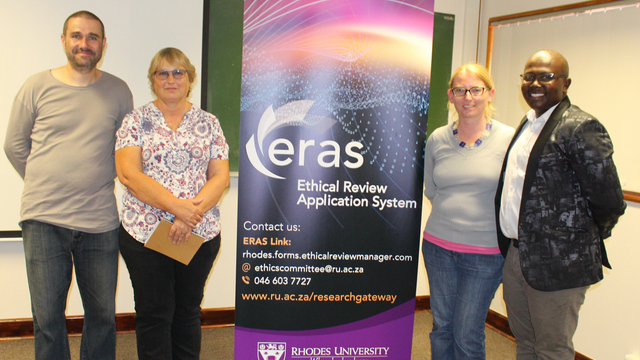
By Julian A Jacobs, PhD candidate, School of Journalism and Media Studies
The days of tedious paperwork for your ethics applications are a thing of the past, with Rhodes University’s newly-launched online ethical review application system (ERAS). ERAS promises to enhance the application experience of researchers and post graduate students.
The Ethics Committee chairperson, Professor Roman Tandlich, indicated that in 2017 an ethics audit was conducted by the National Health Research Ethics Council (NHREC) on Rhodes University’s ethics review processes. The implementation of the ERAS system was one of the recommendations of the NHREC audit.
“One of the key recommendations was that changes needed to be done to the ethics application processes. The main recommendation that came out of the audit was that an online application system should be implemented in order to centralise this function,” he said. The online system endeavours to do this while still allowing Departments to validate submissions through a Department Ethics Representative.
The launch was very well attended. Siyanda Manqele, the newly-appointed Ethics Coordinator who was also facilitating the launch, explained how the new online system would work. ERAS will streamline the application processes. He reassured researchers and students that the “system is interactive, whereby an applicant (researcher or student) would be able to track their application as well as track the progress of their applications. Researchers would receive emails from the system as either a reminder of additional information required or to indicate that your application has been approved”.
He encouraged all researchers and students to align their applications to the ethics committee’s submission dates to avoid delays.
Manqele also stated, “This system is designed to make the lives of applicants easier and simple, yet the quality assurance is maintained according to the Rhodes University policy standards through critical review processes.”
The attendees had various questions concerning this new system. In response to their concerns, he highlighted that the system will only accept Rhodes University emails registered to staff and registered students.
“The system is linked to all researchers and supervisors of students and it is important that the correct details are entered on the system to ensure that supervisors will be able to have access to their student’s applications in order to assist them with the submission,” he said.
He also indicated that the website detailing the activities of the Ethics committees and providing guideline documents is moving from the RUConnected system to the Research Gateway on the Rhodes University website and would thus ensure everyone can access the system.
Manqele articulated that it will take some time for everyone to get used to the system. Rhodes University is over 114 years old and many of the past ethics applications have been done using paper based processes, since ERAS is first of its kind to be launched. He encouraged everyone to create dummy projects to get used to the system first. “Although the system comes with a manual, I am just a phone call away, if you need assistance,” he said.
Chair of the Animal Ethics Committee, Dr Shelley Edwards, indicated that “sometimes change is difficult to implement at institutions as researchers are used to one particular way, but we know this new online system will work and we encourage researchers to get to know it”.
Manqele added, “Ethics systems and discussions at universities are generally seen as closely-guarded and subject to a lot of ‘red tape’, but this is not the case at Rhodes. We prefer to exercise transparency.”
A new draft ethics handbook will be circulated to all faculties over the next three months for comment.
The link to the online ethics review application system is: https://rhodes.forms.ethicalreviewsmanager.com.
